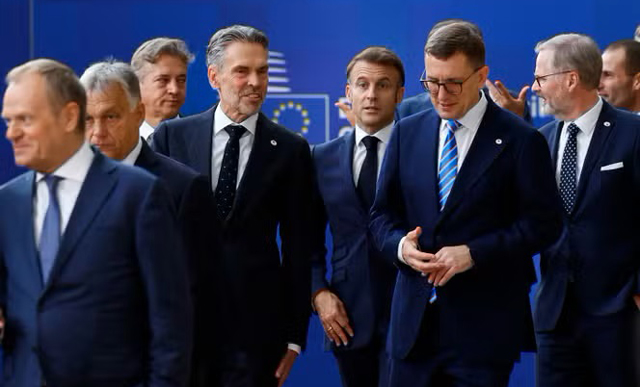News Flash
News Flash

BRUSSELS, Belgium, Oct 18, 2024 (BSS/AFP) - EU leaders called Thursday for urgent new legislation to increase and speed up migrant returns, after a Brussels summit that crystallised a rightward shift in the bloc's rhetoric.
The 27 European leaders said their day-long talks saw "in-depth" discussions on migration -- an issue that has shot up the political agenda following hard-right gains in several countries.
"The European Council calls for determined action at all levels to facilitate, increase and speed up returns from the European Union," they wrote in summit conclusions, asking the European Commission to submit new legislation.
New ways to prevent and counter irregular migration should also be considered, the text read, in an apparent reference to controversial proposals to create return centres outside the European Union, which did not get an outright mention.
Such a move would not be "trivial" but had been discussed, EU chief Ursula von der Leyen told a press conference.
Currently less than 20 percent of people ordered to leave the bloc are returned to their country of origin, according to EU data.
Italy's hard-right Prime Minister Giorgia Meloni hosted a talks on migration ahead of the main event with 10 like-minded countries, including Denmark, the Netherlands, Hungary and Greece.
In a nod to the growing influence of immigration hawks, von der Leyen was also present.
But divisions remained on the next steps, with no concrete plans laid out in the final text. Disagreements caused a previous effort to overhaul migrant return rules to fail in 2018.
- 'Innovative solutions' -
Some countries poured cold water on the more radical ideas, with von der Leyen admitting that "open questions" remained on the creation of so-called "return hubs" -- an issue fraught with legal and ethical concerns.
Spain's Prime Minister Pedro Sanchez said such schemes created more problems than they solved and noted the need for regular migration routes amid a workforce shortage and an ageing population.
"Orderly and responsible migration is a response to the demographic challenge facing Europe," he said.
German Chancellor Olaf Scholz said Berlin preferred an early implementation of a landmark migration pact struck this year, which hardens border procedures and requires countries to take in asylum seekers from "frontline" states or provide money and resources.
"If we all followed the rules we have together, we would already be much further ahead," he said.
Others say the package, set to come into force in June 2026, falls short.
The call to speed up returns echoed an appeal by most states earlier this year for the EU to explore "innovative solutions" to deal with migration.
In a letter this week, von der Leyen promised action and said the bloc will draw lessons from a deal Italy struck with Albania to send some migrants there for processing.
On Thursday the EU chief said other ideas discussed at the summit included reviewing the concept of "safe third country" -- nations asylum seekers can be legally sent back to -- and working with UN agencies to help "stranded" migrants to return to their country of origin.
Italy has been pushing to ease the return of Syrian refugees, amid fears that Israel's war in Lebanon -- where many Syrians fled their country's civil war -- could spark a new migratory wave towards Europe.
- 'New wind' -
The general hardening in tone comes despite a drop in detected irregular border crossings into the European Union, by more than 40 percent this year after reaching an almost 10-year peak in 2023.
"There is a new wind blowing in Europe," said Dutch politician Geert Wilders, in Brussels for a meeting of the far-right Patriots for Europe group in the European Parliament.
Hard-right parties, often riding anti-immigrant sentiment, performed strongly in European Parliament elections in June, and have topped recent national and regional votes in Austria, Germany and the Netherlands.
France also tilted to the right after a parliamentary election in July.
Germany tightened border controls in September in response to several suspected Islamist attacks.
And this month Poland said it would partially suspend asylum rights, accusing Russia and Belarus of pushing migrants over the border to destabilise the country -- a tactic the leaders vowed to confront in their summit conclusions.
Ukrainian President Volodymyr Zelensky also attended the meeting to present Kyiv's "victory plan" to defeat Russia. EU leaders also discussed the conflicts in Gaza and Lebanon.